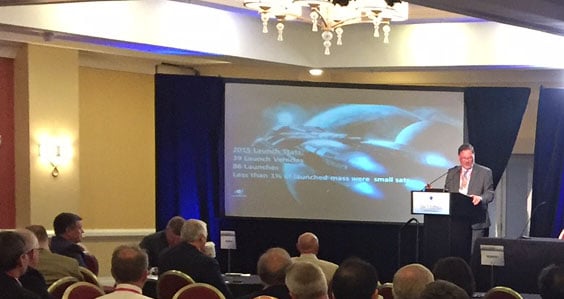Second View
Calling all (space) startups!
Written by: developer
by Micah Walter-Range, Space Foundation Director – Research & Analysis
In mid-August 2016, the Space Foundation hosted its second annual Space Technology & Investment Forum (pictured) in San Francisco, bringing together startups, investors, and established space companies. Much of the discussion centered around how to support the continued improvement of technology for space, whether by old or new companies. Several panels raised the point that new space companies often choose to de-emphasize the space aspects of their business when seeking investment.
 From an investor’s perspective, this can be a smart move. Venture capital firms and angel investors have a long history of supporting the growth of terrestrial technology companies, but most of them have not had any experience with space. Despite being willing to accept a certain level of risk in their investments, most prefer to understand the market that their portfolio companies are entering. This means that a startup is more likely to find investors if it presents itself as a communications company (“we connect people around the world”) or a data analysis company (“we use machine learning to extract market intelligence from imagery”) rather than a space company (“we use explosions to fling delicate hardware high in the sky”).
From an investor’s perspective, this can be a smart move. Venture capital firms and angel investors have a long history of supporting the growth of terrestrial technology companies, but most of them have not had any experience with space. Despite being willing to accept a certain level of risk in their investments, most prefer to understand the market that their portfolio companies are entering. This means that a startup is more likely to find investors if it presents itself as a communications company (“we connect people around the world”) or a data analysis company (“we use machine learning to extract market intelligence from imagery”) rather than a space company (“we use explosions to fling delicate hardware high in the sky”).
From a startup’s perspective, looking past the space element often indicates maturity and a solid business case. It means that the startup is focused on the very end of the value chain, creating tailored solutions that meet the customer’s needs. It is not so much a question of what new technology can be developed for space, but how it is used to improve people’s lives and make money. These startups are not misrepresenting the role of space for the sake of courting investors; they are treating it appropriately as a tool rather than a goal in its own right.
Customers primarily care about the final product that the company is providing, rather than how it was produced. As we have seen time and again, many people are unaware that the navigation apps and location-based features on their smartphones rely on satellite signals for accurate positioning. Our daily weather forecasts come from satellites, as do the images for Google Earth. The list of space contributions that often go unnoticed is a long one. To a certain extent, this is a desirable thing — we want space to be integrated into all industries so thoroughly that it is inconceivable they would choose to operate without the capabilities that space provides.
Fortunately, there appears to be little danger that the space industry will lose its distinctiveness even as it continues to be more deeply incorporated within the broad technology sector. There will always be companies (and government agencies — let’s not forget them) that focus primarily on the space aspects of what they do, and achieve headline-grabbing feats of exploration and discovery. There will always be people who are drawn to space because of those activities, but who ultimately choose to go into other areas of the space industry. There will always be children who want to solve global problems, and what better way to do that than from the globe-spanning perspective of space? The future of the space industry is in good hands.
This article is part of Space Watch: September 2016 (Volume: 15, Issue: 9).
